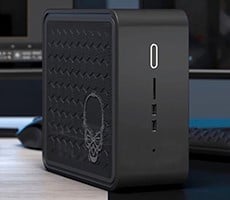Epox eX5-320S SFF PC
|
For our next round of benchmarks, we ran the CPU and Memory performance modules built-into Futuremark's PCMark04. For those interested in more than just the graphs, we've got a couple of quotes from Futuremark that explain exactly what these tests do and how they work...
"The CPU test suite is a collection of tests that are run to isolate the performance of the CPU. There are nine tests in all. Two pairs of tests are run multithreaded - each test in the pair is run in its own thread. The remaining five tests are run single threaded. These tests include such functions as file encryption, decryption, compression and decompression, grammar check, audio conversion, WMV and DivX video compression."

With this test, we see a direct correlation between the "reported" CPU speed and the CPU performance. One may notice from time to time that even though they have installed a CPU in their system, the system properties may have a slightly faster speed listed there than the actual rating. Board engineers often tinker around with timings and use other optimizations to get better results in benchmarks and reviews. As such, we feel it's only fair to point out that the Asus P4P800 "read" our CPU as 2.42GHz, and the Epox at 2.41GHz. Only the Shuttle board came in at the expected 2.4GHz. These slight bumps in speed more than likely account for the (admittedly minor) differences in the PCMark04 CPU testing.
|
|
"The Memory test suite is a collection of tests that isolate the performance of the memory subsystem. The memory subsystem consists of various devices on the PC. This includes the main memory, the CPU internal cache (known as the L1 cache) and the external cache (known as the L2 cache). As it is difficult to find applications that only stress the memory, we explicitly developed a set of tests geared for this purpose. The tests are written in C++ and assembly. They include: Reading data blocks from memory, Writing data blocks to memory performing copy operations on data blocks, random access to data items and latency testing."

The Asus board led here as well, with the Epox board in the middle and the Shuttle placing third. Again, we would like to point out an optimization, if you will, that accounts for the discrepancy. Perhaps old news to most of us, many i865 boards came with some form of "memory acceleration" which more or less leveled the playing field between Springdale and Canterwood boards. As we've shown in the past, Asus' engineers seemed to have the upper hand in this area, which is why we voted favorably on the P4P800 Deluxe in the past. Epox has also incorporated an enhancement into their boards called AMM (which we covered in the BIOS section), which also does a good job, as shown. The Shuttle board has no enhancements whatsoever, which is the sole reason why it came in last. PCMark04 testing has proved an old adage, "you get out what you put in".






